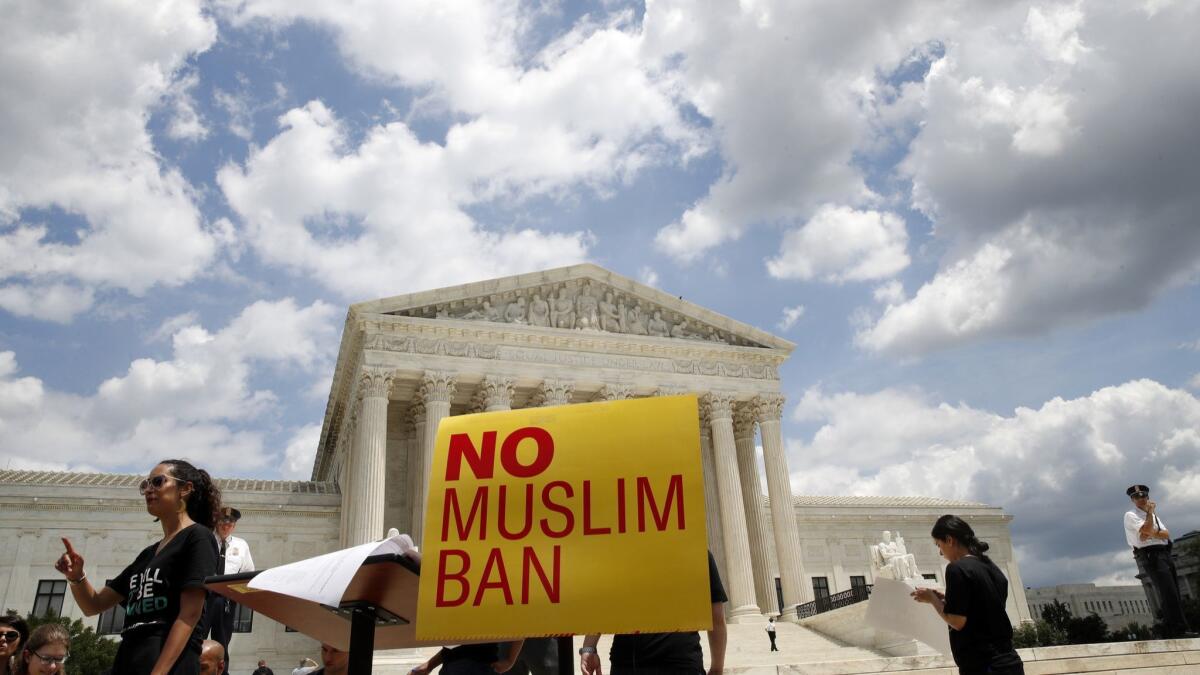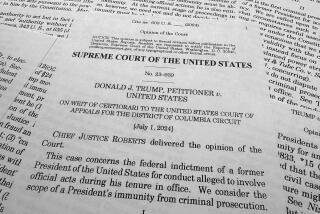Editorial: Trump’s travel ban might be legal, but it’s still bad policy

- Share via
The Supreme Court ruled Tuesday that the third iteration of President Trump’s travel ban on people from several mostly Muslim countries was facially neutral and that the government had “set forth a sufficient national security justification” for the policy. That’s the threshold the ban needed to meet to pass legal muster. But only an amnesiac would forget the clear animus toward immigrants — with a special nasty focus on Muslims — that Trump exhibited on the campaign trail and that propelled this foolish and counterproductive policy.
One of the first things Trump did after taking office was to act on his campaign statement that he wanted a “total and complete shutdown of Muslims” entering the U.S. That position was forged in reaction to international terrorism by Islamic extremists, including the San Bernardino massacre by an American-born Muslim and his Pakistani wife, as well as the then-raging war against Islamic State. And it was based on clear and deplorable perceptions among Trump and his nativist advisors that the actions of the few indict the many. “I think Islam hates us,” Trump said in 2016. “There’s a tremendous hatred there.”
After several court battles sent him back to the drawing board, Trump finally signed the narrowly tailored travel ban that was at issue in Tuesday’s ruling. The administration framed it within a national security context and said the countries from which travelers were banned had failed to share sufficient information for U.S. officials to determine whether potential travelers posed a threat. That ban applied to six predominantly Muslim nations — Iran, Libya, Syria, Yemen, Somalia and Chad (which was later removed) — as well as to North Korea and certain government officials from Venezuela.
Significantly, the court held that while most of the countries targeted by Trump’s ban are predominantly Muslim, “that fact alone does not support an inference of religious hostility, given that the policy covers just 8% of the world’s Muslim population and is limited to countries that were previously designated by Congress or prior administrations as posing national security risks.” So the president managed to affix a large enough fig leaf to hide his bias.
Enter the Fray: First takes on the news of the minute from L.A. Times Opinion »
As policy, though, the ban is awful. It creates a broad exclusion for entry to the U.S. based on discriminatory misconceptions and punishes entire nations for the misdeeds of a few. And it doesn’t even get the nations right. The countries targeted in the ban are not responsible for the fatal terror attacks that have occurred in recent years. The 9/11 attackers were primarily from Saudi Arabia, and terrorist attacks in Europe over the last few years were committed primarily by Europeans who embraced Islamic extremism. The linkage between terrorist acts and the banned nations is unreasonable, as is this policy.
Follow the Opinion section on Twitter @latimesopinion or Facebook
More to Read
A cure for the common opinion
Get thought-provoking perspectives with our weekly newsletter.
You may occasionally receive promotional content from the Los Angeles Times.










